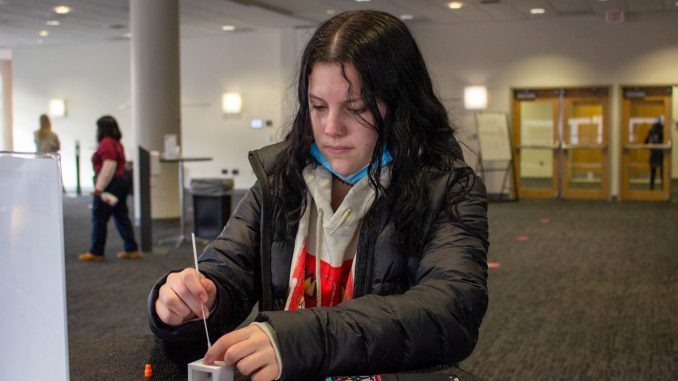
Although the number of COVID-19 tests Temple University administered each week increased this semester, the nearly $10 million Temple spent on spring semester’s testing program is comparable to the amount spent on testing during the fall semester, said Mark Denys, director of Student Health Services.
“The testing technologies have just become significantly less expensive,” Denys said. “Whereas back in August we were paying either $125 or $150 a test, we’re now paying $80. The testing with the medical school lab is down to almost $12, and some rapid testing is only $15 or $20.”
The effectiveness of this new program will be clearer in the long term, but it is promising that the COVID-19 positivity rate has dropped significantly since the fall semester, Denys said.
During the 16 weeks of fall semester from Aug. 24, 2020, to Dec. 7, 2020, Temple averaged a COVID-19 test positivity rate of 5.08 percent. During the first four weeks of spring semester beginning Jan. 17, Temple averaged a COVID-19 test positivity rate of 0.92 percent, according to the university’s COVID-19 dashboard.
Temple administered nearly 21,000 COVID-19 tests during the entire fall semester and 36,220 COVID-19 tests during the first month of spring semester, according to the dashboard.
“We’ve done just about as many tests in the first two weeks of this semester as we did during the entire first semester,” Denys said.
During the fall semester, Philadelphia Health Commissioner Thomas Farley labeled the number of cases at Temple as an “outbreak,” as Temple recorded a COVID-19 test positivity rate of more than 10 percent, The Temple News reported.
Now, Temple is going “above and beyond” what the Philadelphia Department of Public Health and the Centers for Disease Control and Prevention require of universities, said Matthew Rankin, a spokesperson for the PDPH.
“Temple is taking it very seriously, and we appreciate that,” he added. “We don’t require that colleges or universities do that, but we believe it will definitely curb any sort of spike from college populations.”
Students can go to the Patient Health Portal to schedule an appointment beginning on Fridays for the following week, The Temple News reported.
Esther Kim, a freshman legal studies and international business major, has been getting tested twice per week this semester and wishes Temple would open the testing schedule earlier.
“I don’t get why you have to wait so long to sign up for a test,” Kim said.
Temple wants to continue to ensure that everyone who needs to get tested has the same number of appointments available to them each week, Denys said.
“There is an equitable distribution of appointments,” he said. “If people scheduled tests for the next four weeks, and you then add 200 people, they’ll all have far fewer choices.”
Test schedules don’t open weeks in advance due to snow days and people forgetting or missing their appointments, which is more likely if they schedule weeks in advance, Denys added.
With a vast increase in testing from the fall semester, Temple set up two asymptomatic student testing sites in Room 200ABC in the Howard Gittis Student Center and the Great Court in Mitten Hall, The Temple News reported.
Symptomatic students must make an appointment at the Morgan Hall testing site, The Temple News reported.
Students who have tested positive in the last 90 days do not have to get tested, but those who received a COVID-19 vaccine must still get tested, The Temple News reported.
“It’s a little tough the first time, putting it up your own nose, but it’s definitely the best way to do it,” said Jeremy Smith, a freshman finance major, who self-administers two tests per week. “You get used to it and you’re in and out of there in under five minutes. It’s the best way to be able to keep kids on campus.”
The current testing program will be in place throughout the spring semester. Temple will announce the testing plan for the summer in the coming weeks, Denys said.


Be the first to comment